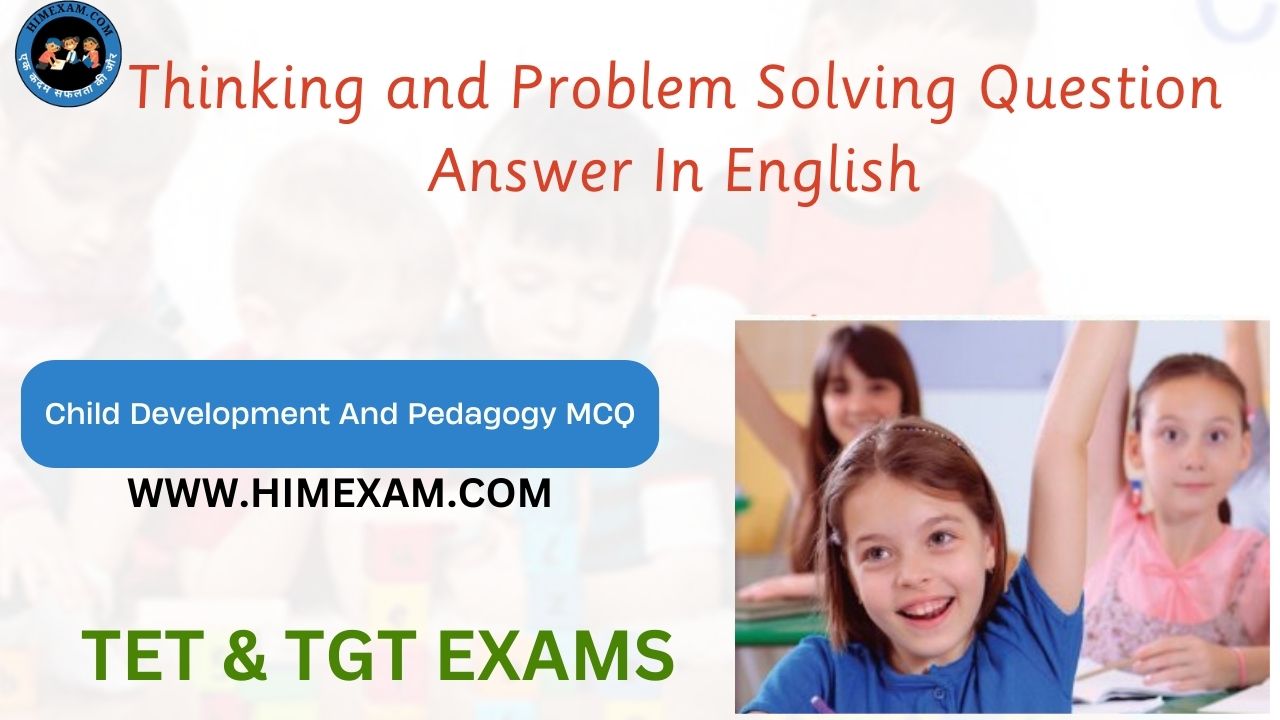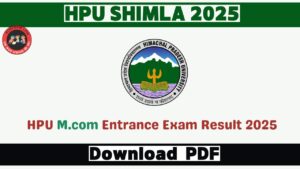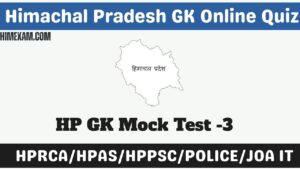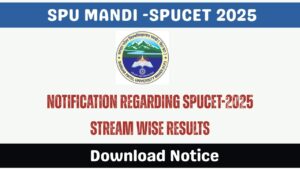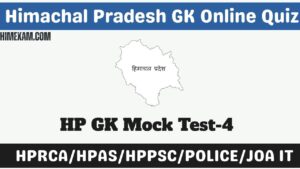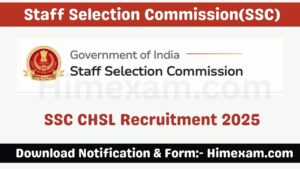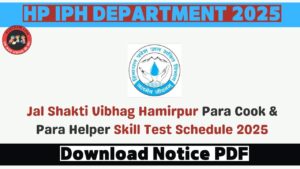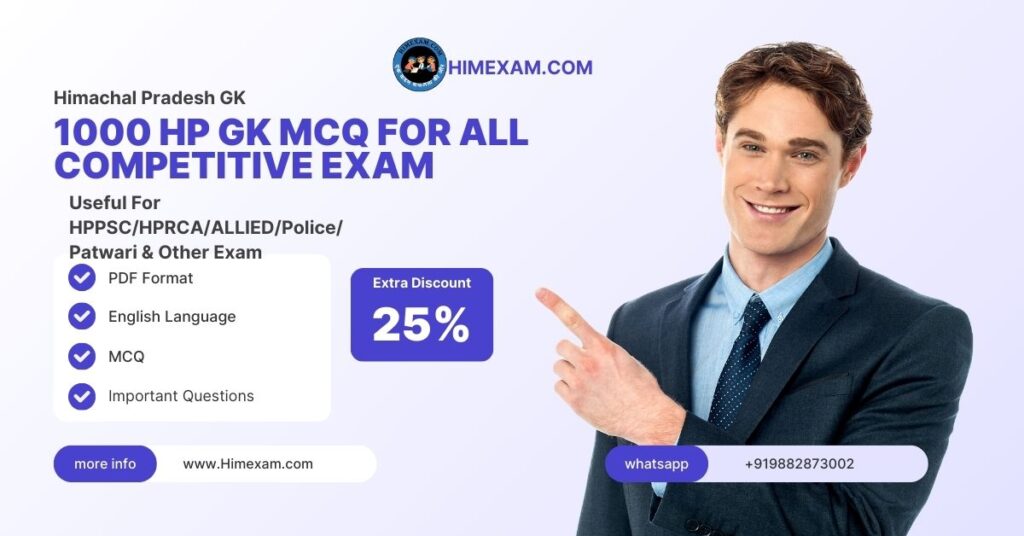Table of Contents
ToggleThinking and Problem Solving Question Answer In English
Thinking and Problem Solving Question Answer In English Question Answer In English :-If you are preparing for any HPTET & HPTGT paper then this post is very important for you. This post contains Thinking and Problem Solving Question Answer In English Question Answer In English . Check our website daily to see other parts.
Test Series & Ebooks:-
Thinking and Problem Solving Question Answer In English For TET & TGT Exam:
1. The Gestalt theory of thinking is mainly based on
(1) On the span of instantaneous memory
(2) On thinking totality and Productivity
(3) On the convergent process
(4) On the divergent process
2. The following elements are involved in the four stages of concept formation.
(a) Comparison
(b)Generalization
(c) Cognitive structure
(d) Sensory images
Which one is the correct sequence in generating the process of concept formation?
(1) a, b
(2) a, b, c
(3) b and d
(4) All of the above
3. People often do not strictly apply logical rules to problem solving because
(1) They are incapable of hypothesis testing.
(2) They do not have enough memory.
(3) The rules of logic are not usable.
(4) They are adequately trained in irrational thinking.
4. In deductive reasoning, the direction of reasoning is
(1) General to Particular
(2) Particular to General
(3) Can be in both directions
(4) Can be in opposite directions.
5. Which is the least correct of the following about thinking?
(1) Thinking is often motivated.
(2) Thinking usually occurs without problems.
(3) Thinking is influenced by the set.
(4) Thinking is often directed in the direction.
6. In the Piaget model, the state in which behaviour is largely determined by reflexes is called
(1) Pre-operational stage
(2) Concrete operational stage
(3) Sensory motor stage
(4) Formal operational stage
7. The process of concept formation involves
(1) Distinctiveness
(2) Mental attitude
(3) Discrimination
(4) Transfer
8. Which of the following guarantees problem solving?
(1) Obstacle Removal
(2) Algorithm
(3) Heuristics
(4) Means-benefit analysis
9. Rule of thumb method which helps in making an effective search of the selection of the problem is called
(1) Algorithm
(2) Education
(3) Heuristics
(4) Learning
10. Which among the following is the correct sequence of events in creative problem solving?
(1) Illumination, Incubation, Verification, Preparation
(2) Preparation, Verification, Illumination, Authentication
(3) Preparation, incubation, Illumination, Verification
(4) Incubation, Illumination, preparation, Verification
11. Incubation in Creative thinking is involved in the process of emergence in the form of…
(1) New Solution
(2) Unconscious Thinking Process
(3) Insightful process
(4) Verbal thinking
12. The theory of cognitive development as propounded by Piaget is related to the ability to reason through overt actions in which stage?
(1) Sensory-motor
(2) Pre-operational
(3) Concrete Operationa
l (4) All of the above
13. Experimental verification of concept formation is done by which of the following test?
(1) Ishihara test
(2) Collins and Driver test
(3) Alexander block design test.
(4) Hoffman-Kesamin test;
14. The first step in problem solving is
(1) Problem Solving
(2) Problem Selection
(3) Finding Problem Solving Methods
(4) Conducting test
15. Which branch of psychology is knowledge creation?
(1) Constructivism
(2) Psychoanalyticism
(3) Functionalism
(4) None of these
16. Who is the psychologist of cognitive theory?
(1) Kohler
(2) Tolman
(3) Coleman
(4) Piaget
17. What factors have been included by Lev Vygotsky in cognitive development?
(1) Culture-Religion
(2) Culture-Language
(3) Culture-caste
(4) Culture-region
18. The components of the socio-cultural environment are
(1) Religion
(2) Family
(3) Politics
(4) All of the above
19. Inductive Intelligence progresses from
(1) Concrete to intangible
(2) General to Particular
(3) High to low
(4) Left to right
20. The most reflective contribution on the development of ‘thinking’ in children is?
(1) Jean Piaget
(2) Lev Vygotsky
(3) B. F. Skinner
(4) JB. Watson
21. Which method is used to estimate the general rule in special circumstances?
(1) Inductive method
(2) Deductive method
(3) Inductive-deductive method
(4) All of the above
22. Which of the following is related to savings method?
(1) Re-learning: Ebinnghaus
(2) Effort-Learning: Thorndike
(3) Insight: Kohler
(4) Cognition: Piaget
23. Incubation means
(1) Work holiday
(2) Work interval
(3) Meaningful interval
(4) All of the above
24. Which of the following statements is false?
(1) All reflective are intelligent
(2) All creative are intelligence
(3) All intelligent are creative
(4) The problem solver is reflective
25. The science of knowledge is called
(1) Epistemology
(2) Axiology
(3) Ethics
(4) Theology
More Pages:-
हेलो दोस्तों ,आपका हमारी वेबसाइट Himexam.com पर स्वागत है। जैसा की आपको पता है हमारी वेबसाइट Himexam.com आपको समय-समय पर सभी HP Govt Jobs & All India Govt Jobs की Notifications प्रदान करवाती है। साथ ही साथ Himachal Pradesh Exam Previous Paper और Himachal Pradesh GK ,Himachal Pradesh & National +International Current Affairs के सभी नोट्स मुफ्त उपलब्ध करवाते है। हमारी वेबसाइट के अलग अलग प्लेटफार्म पर pages & Group बने है जैसे की facebook ,Telegram और Instagram .. अगर आप हिमाचल के किसी भी पेपर की तैयारी कर रहे हो तो जल्दी से इन groups के साथ जुड़ जाएं इनके लिंक नीचे table में दिए गए है।
Join Us:-
| Like Our Facebook Page | Click here |
| Join Us oN Telegram | Click here |
| Join Us On Instagram | Click Here |

